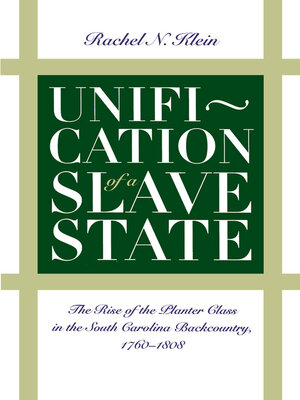Unification of a Slave State
ebook ∣ The Rise of the Planter Class in the South Carolina Backcountry, 1760-1808 · Omohundro Institute of Early American History and Culture and the University of North Carolina Press
By Rachel N. Klein

Sign up to save your library
With an OverDrive account, you can save your favorite libraries for at-a-glance information about availability. Find out more about OverDrive accounts.
Find this title in Libby, the library reading app by OverDrive.



Search for a digital library with this title
Title found at these libraries:
| Library Name | Distance |
|---|---|
| Loading... |
This book describes the turbulent transformation of South Carolina from a colony rent by sectional conflict into a state dominated by the South’s most unified and politically powerful planter leadership. Rachel Klein unravels the sources of conflict and growing unity, showing how a deep commitment to slavery enabled leaders from both low– and backcountry to define the terms of political and ideological compromise.
The spread of cotton into the backcountry, often invoked as the reason for South Carolina’s political unification, actually concluded a complex struggle for power and legitimacy. Beginning with the Regulator Uprising of the 1760s, Klein demonstrates how backcountry leaders both gained authority among yeoman constituents and assumed a powerful role within state government. By defining slavery as the natural extension of familial inequality, backcountry ministers strengthened the planter class. At the same time, evangelical religion, like the backcountry’s dominant political language, expressed yet contained the persisting tensions between planters and yeomen.
Klein weaves social, political, and religious history into a formidable account of planter class formation and southern frontier development.
The spread of cotton into the backcountry, often invoked as the reason for South Carolina’s political unification, actually concluded a complex struggle for power and legitimacy. Beginning with the Regulator Uprising of the 1760s, Klein demonstrates how backcountry leaders both gained authority among yeoman constituents and assumed a powerful role within state government. By defining slavery as the natural extension of familial inequality, backcountry ministers strengthened the planter class. At the same time, evangelical religion, like the backcountry’s dominant political language, expressed yet contained the persisting tensions between planters and yeomen.
Klein weaves social, political, and religious history into a formidable account of planter class formation and southern frontier development.







